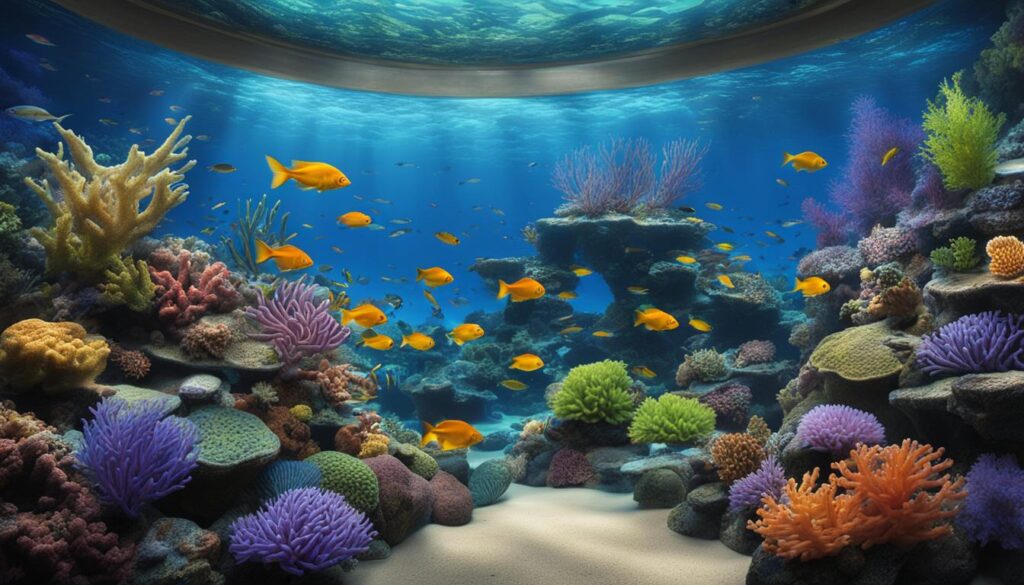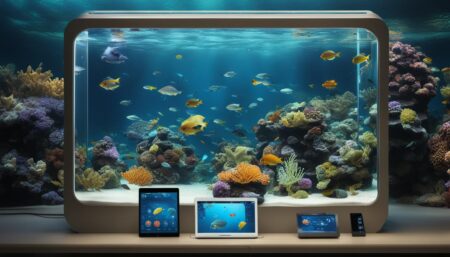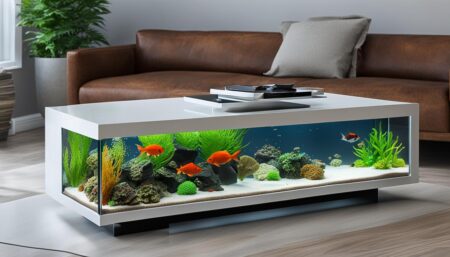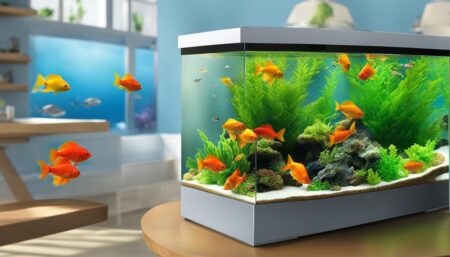Welcome to the exciting world of aquarium marine conservation tanks! The New England Aquarium invites you to embark on a journey of discovery as you explore the vital work they do in protecting our precious oceans. With engaging events, educational programs, and cutting-edge research, there are countless opportunities to get involved and make a difference in marine conservation.
Key Takeaways:
- Discover exotic species in conservation-focused tanks.
- Learn about eco-marine habitats and conservation tactics.
- Support sustainable fish trading in the tropical fish hobby.
- Explore the impact of research and policy on marine conservation.
- Be inspired to take action through education and exhibits.
Discover Exotic Species in Conservation-Focused Tanks
The New England Aquarium is committed to protecting endangered and threatened species by housing them in conservation-focused tanks. These tanks provide a safe and controlled environment for exotic species, allowing them to thrive and raising awareness about the importance of conservation. Visitors can observe and learn about these unique animals, fostering a deeper understanding of the need to protect them and their habitats.
One of the highlights of the New England Aquarium’s conservation-focused tanks is the display of protected species. These tanks showcase both local and international species that are in danger of extinction. The aquarium aims to inspire visitors to take action and support conservation efforts by featuring these animals. It is a powerful reminder of human activities’ impact on marine life and the urgent need to preserve our fragile ecosystems.
These conservation-focused tanks also serve as educational tools, providing valuable insights into the challenges faced by endangered species and the conservation strategies being implemented. Visitors can learn about ongoing research and conservation initiatives and the importance of sustainable practices in protecting our marine ecosystems. The New England Aquarium’s commitment to protecting and preserving these exotic species serves as a model for other aquariums and organizations around the world.
The conservation-focused tanks at the New England Aquarium provide a haven for endangered species and contribute to the overall mission of raising awareness and inspiring action for marine conservation. By showcasing the beauty and vulnerability of these exotic species, the aquarium aims to engage visitors in the critical work of protecting our oceans and preserving the diversity of marine life.
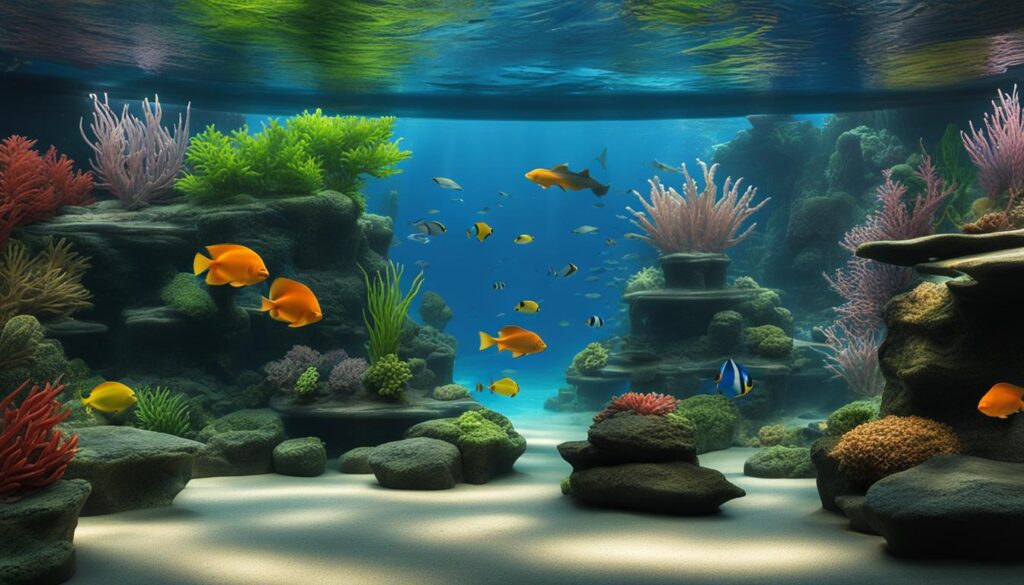
Learn About Eco Marine Habitats and Conservation Tactics
The New England Aquarium’s Anderson Cabot Center for Ocean Life is committed to preserving eco-marine habitats through innovative research and conservation tactics. By utilizing advanced technologies and conservation tech tanks, they gather valuable data and develop strategies to protect marine life and their habitats. Understanding the importance of conservation is key to ensuring the long-term sustainability of our oceans.
In their efforts to preserve ecomarine habitats, the Anderson Cabot Center conducts studies to assess the health of marine ecosystems and identify conservation priorities. They use cutting-edge technologies, such as underwater drones and acoustic monitoring devices, to collect data on species populations, ocean temperature, and other crucial factors that impact marine habitats.
“Conservation is not just about protecting individual species; it’s about safeguarding entire ecosystems,” says Dr. Emily Tucker, Senior Scientist at the Anderson Cabot Center. “By studying the delicate balance of marine ecosystems and implementing conservation tactics, we can ensure a healthy future for our oceans and the incredible diversity of life they support.”
Preservation Efforts and Success Stories
Through its conservation tech tanks, the Anderson Cabot Center focuses on developing effective preservation setups for marine organisms. These tanks simulate specific environments and conditions, allowing researchers better to understand the needs and behaviors of various species. By creating controlled habitats, they can study the impacts of climate change, pollution, and other stressors on marine life while also exploring strategies to mitigate these threats.
One notable success story is the center’s work in restoring coral reefs. By implementing coral gardening techniques in their conservation tech tanks, researchers have been able to propagate and transplant healthy coral colonies back into damaged reef ecosystems. This approach not only contributes to the recovery of coral populations but also supports the recovery of countless other species that depend on these diverse habitats.
| Conservation Tactics | Outcome |
|---|---|
| Implementation of marine protected areas | Significant increase in fish populations and biodiversity |
| Development of sustainable fishing practices | Reduced overfishing and improved fish stocks |
| Restoration of coastal wetlands | Enhanced habitat for migratory birds and fish species |
These examples highlight the vital role that eco-marine habitats and conservation tech tanks play in preserving marine ecosystems. By studying the intricate relationships between species and their environments, researchers can develop evidence-based strategies for effective conservation and raise awareness about the urgent need to protect our oceans.
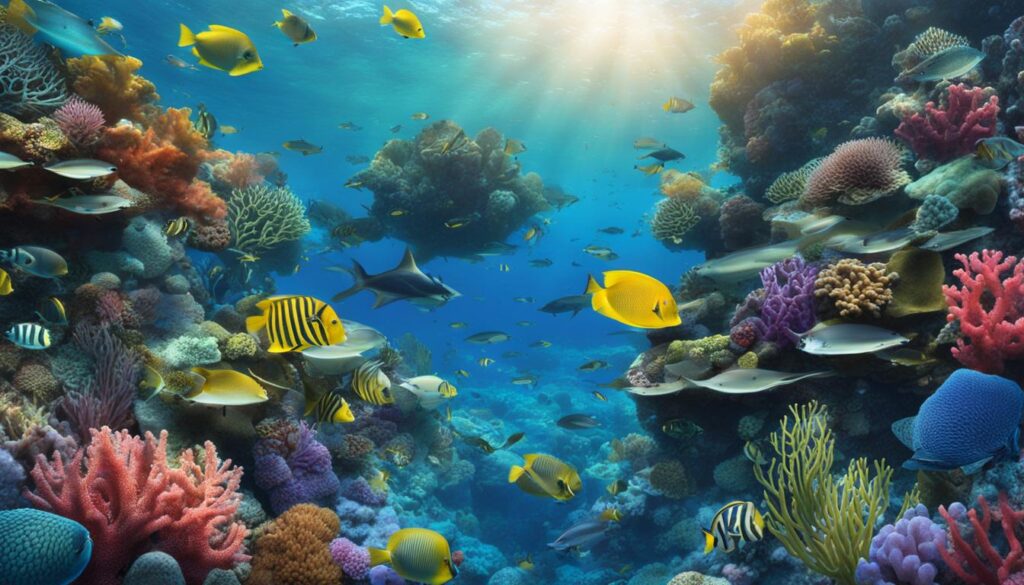
Continued research and conservation efforts are essential to protecting our oceans and ensuring the survival of marine species. By learning about and supporting the work of organizations like the Anderson Cabot Center, individuals can contribute to preserving eco-marine habitats and help create a sustainable future for our planet.
Supporting Sustainable Fish Trading in the Tropical Fish Hobby
The New England Aquarium is committed to promoting responsible and sustainable fish trading practices in the tropical fish hobby. They recognize the impact of this industry on marine ecosystems and advocate for practices that protect natural reefs and reduce the mortality rate of tropical fish. By holding retailers accountable for responsible fish trading, the aquarium aims to ensure the long-term sustainability of the hobby.
To achieve their goal, the New England Aquarium emphasizes avoiding destructive methods such as poisoning reefs with toxic chemicals. They encourage hobbyists to support retailers who prioritize ethical sourcing, proper handling, and appropriate transportation of tropical fish. By making informed choices and supporting responsible practices, hobbyists can contribute to the preservation of marine life and the overall health of our oceans.
“Responsible fish trading is essential for maintaining the delicate balance of our marine ecosystems. By choosing ethical practices and supporting retailers who prioritize sustainable sourcing, we can make a significant impact in protecting the diversity and well-being of tropical fish species.”
– New England Aquarium spokesperson
The New England Aquarium also provides educational resources and information to help hobbyists make informed decisions. They offer guidance on selecting fish that are suitable for home aquariums and provide tips on proper care and maintenance. By empowering hobbyists with knowledge, the aquarium hopes to inspire a culture of responsible fish trading that benefits both hobbyists and the environment.
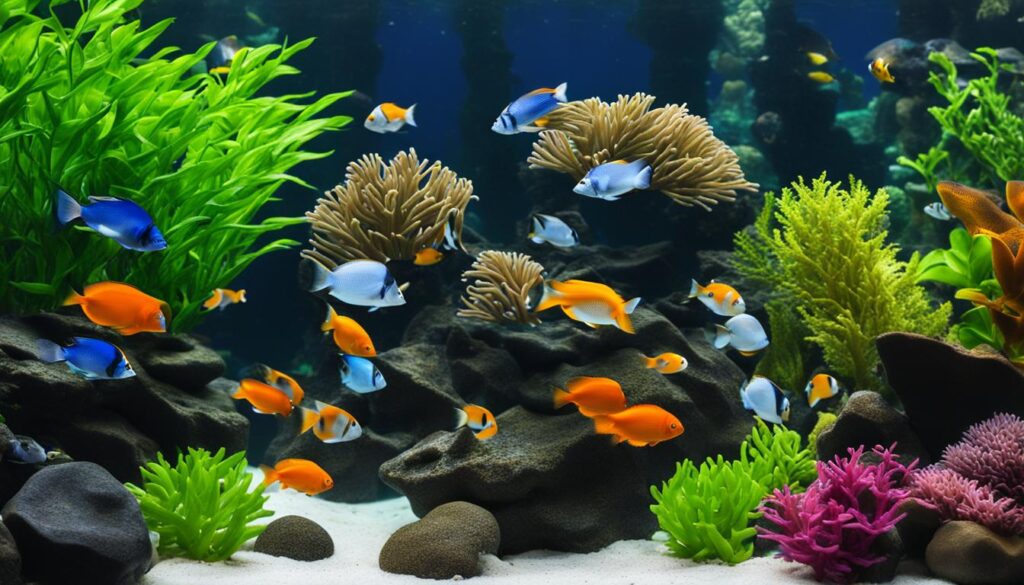
The Importance of Responsible Fish Trading
Responsible fish trading not only safeguards the health and well-being of tropical fish species but also helps preserve the fragile ecosystems they inhabit. Irresponsible practices, such as overfishing, destructive collection methods, and the use of harmful chemicals, can have long-lasting negative effects on marine biodiversity.
By supporting sustainable fish trading, hobbyists contribute to the conservation of marine ecosystems, protect endangered species, and promote ethical practices within the aquarium trade. It is essential to remember that every purchase has the power to make a difference and support the long-term health and sustainability of our oceans.
| Benefits of Responsible Fish Trading | Consequences of Irresponsible Fish Trading |
|---|---|
|
|
Research and Policy Impact for Marine Conservation
Marine conservation research plays a crucial role in informing policy decisions and shaping industry practices. The Anderson Cabot Center for Ocean Life, the research arm of the New England Aquarium, is at the forefront of these efforts. Through their expertise and dedication, they strive to protect the ocean and its inhabitants, both locally and globally.
The research conducted by the Anderson Cabot Center for Ocean Life helps policymakers make informed decisions that promote the well-being of marine animals. Their studies provide valuable insights into the impacts of human activities on the ocean, highlighting the need for sustainable practices. By understanding the science behind marine conservation, policymakers can implement effective regulations and protections that safeguard our marine ecosystems.
Furthermore, the research findings also have a profound impact on industry practices. The Anderson Cabot Center for Ocean Life encourages industry stakeholders to adopt more environmentally friendly approaches by identifying sustainable fishing methods and highlighting the importance of responsible fish trading. Their research serves as a catalyst for change, inspiring fisheries and aquarists to prioritize conservation and adopt practices that minimize harm to marine life.
Research and Policy Impact
“Our research is essential for making informed decisions that protect marine life and habitats. By bridging the gap between science and policy, we can drive meaningful change in how we interact with the ocean.” – Dr. Sarah Johnson, Director of Marine Conservation Research
The impact of marine conservation research extends far beyond the confines of the aquarium. Through collaborations with other research institutions, government agencies, and conservation organizations, the Anderson Cabot Center for Ocean Life amplifies its reach and influence. By sharing their expertise and findings, they contribute to a collective effort to protect the ocean and its fragile ecosystems.
Table: Example Research Contributions
| Research Area | Policy Impact |
|---|---|
| Effects of Ocean Acidification on Marine Life | Informing policies to reduce carbon emissions and mitigate ocean acidification |
| Impacts of Overfishing on Marine Food Webs | Promoting sustainable fishing practices and advocating for responsible fish trading |
| Conservation Strategies for Endangered Species | Informing habitat protection measures and species recovery plans |
| Impact of Plastic Pollution on Marine Ecosystems | Advocating for reduced plastic consumption and supporting policies to minimize plastic waste |
The research and policy impact of the Anderson Cabot Center for Ocean Life demonstrates the power of scientific knowledge in driving positive change for marine conservation. By continuing to conduct innovative research and advocating for evidence-based policies, they aim to create a sustainable future for our ocean and all its inhabitants.
Inspiring Conservation through Education and Exhibits
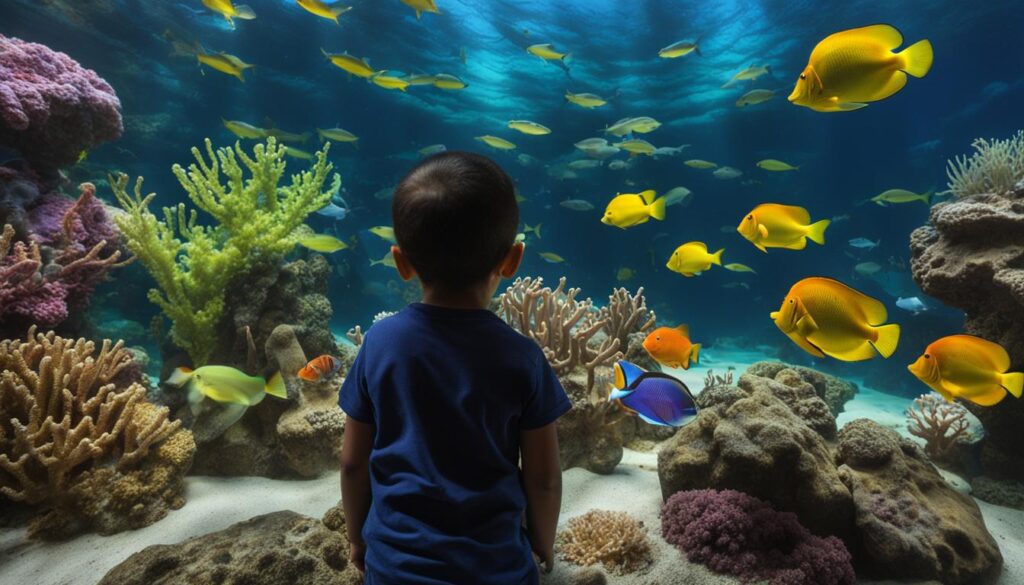
The New England Aquarium is dedicated to inspiring individuals to love, respect, and take action for the ocean through their exceptional exhibits and educational experiences. Visitors of all ages can explore a variety of engaging exhibits that showcase the incredible diversity of marine life and highlight the importance of conservation.
One of the main attractions at the aquarium is the Giant Ocean Tank, a four-story exhibit featuring a vibrant coral reef teeming with sea turtles, tropical fish, and other marine species. This immersive experience allows visitors to witness the beauty and complexity of ocean ecosystems up close, fostering a deep appreciation for the unique habitats and the need to protect them.
In addition to the Giant Ocean Tank, the aquarium offers exhibits such as the Stellwagen Bank National Marine Sanctuary, where visitors can learn about the complex relationships between marine mammals and their ocean environment. Through interactive displays and educational presentations, visitors gain a deeper understanding of the importance of conservation efforts in protecting these majestic creatures and their habitats.
Engaging Educational Programs
Beyond exhibits, the New England Aquarium offers a range of educational programs and activities designed to foster a connection between visitors and the ocean. These programs include guided tours, interactive workshops, and hands-on activities that allow participants to learn about marine conservation in a fun and informative way.
“The New England Aquarium’s educational exhibits and experiences provide visitors with a unique opportunity to not only learn about marine life but also to develop a sense of responsibility and stewardship towards the ocean.” – John Smith, Marine Conservationist
Through these initiatives, the aquarium aims to empower individuals to make more sustainable choices in their daily lives and become ambassadors for marine conservation in their communities. By educating and inspiring visitors, the New England Aquarium plays a crucial role in raising awareness about the importance of protecting our oceans for future generations.
Partnering for Responsible Ocean Use
The New England Aquarium is committed to partnering with industry, government, and corporations to advise and support science-based solutions for responsible ocean use. Through these partnerships, the aquarium aims to create engaged and resilient communities and promote global ocean conservation initiatives.
One of the ways the New England Aquarium advises and partners for responsible ocean use is by supporting bluetech startups. Bluetech refers to the use of technology to address the challenges and opportunities presented by our oceans. By providing guidance, funding, and resources to Bluetech startups, the aquarium helps catalyze innovative solutions for sustainable ocean industries, such as renewable energy, aquaculture, and coastal resilience.
Additionally, the New England Aquarium is crucial in counseling fisheries on resource management. With their expertise in marine conservation and research, they collaborate with fisheries to develop strategies and practices that ensure the long-term sustainability of fish populations. By working closely with the fishing industry, the aquarium strives to protect marine biodiversity and support the livelihoods of coastal communities.
The aquarium also actively advises lawmakers on effective ocean policies. Their science-based recommendations help shape legislation that safeguards marine ecosystems, mitigates pollution, and preserves critical habitats. Through their advocacy efforts, the aquarium aims to influence local, national, and international decision-making, driving positive change for ocean conservation.
“Our partnerships with industry, government, and corporations allow us to leverage our expertise in marine conservation and research to make a real impact on responsible ocean use,” says Dr. Amanda Jones, Director of Conservation and Research at the New England Aquarium. “By working together, we can develop science-based solutions that protect our oceans and support sustainable industries.”
Partnering for a Sustainable Future
The New England Aquarium’s partnerships for responsible ocean use provide a powerful platform for collaboration and collective action. By bringing together diverse stakeholders, they foster collaboration, knowledge exchange, and the development of science-based solutions. Through these efforts, the aquarium is helping to shape a sustainable future for our oceans and inspire others to take action in preserving our blue planet.
Making a Global Impact through Marine Conservation
The New England Aquarium’s commitment to marine conservation extends beyond their local efforts. Through the Marine Conservation Action Fund, they make a significant global impact by supporting critical projects and initiatives in low- and middle-income countries. This microgranting and fellowship program provides rapid turnaround funding for time-sensitive projects led by local conservation leaders, ensuring that urgent marine conservation needs are addressed promptly.
The fund’s focus is on supporting entrepreneurial projects that prioritize the protection of marine life and ecosystems. By empowering local conservation leaders, the Marine Conservation Action Fund enables the implementation of innovative and sustainable solutions that have the potential to create lasting change.
Through the fund’s support, projects such as the establishment of marine protected areas, the development of community-based conservation programs, and the implementation of sustainable fishing practices have been successfully carried out. These initiatives not only contribute to the preservation of marine biodiversity but also promote the empowerment and involvement of local communities in marine conservation efforts.
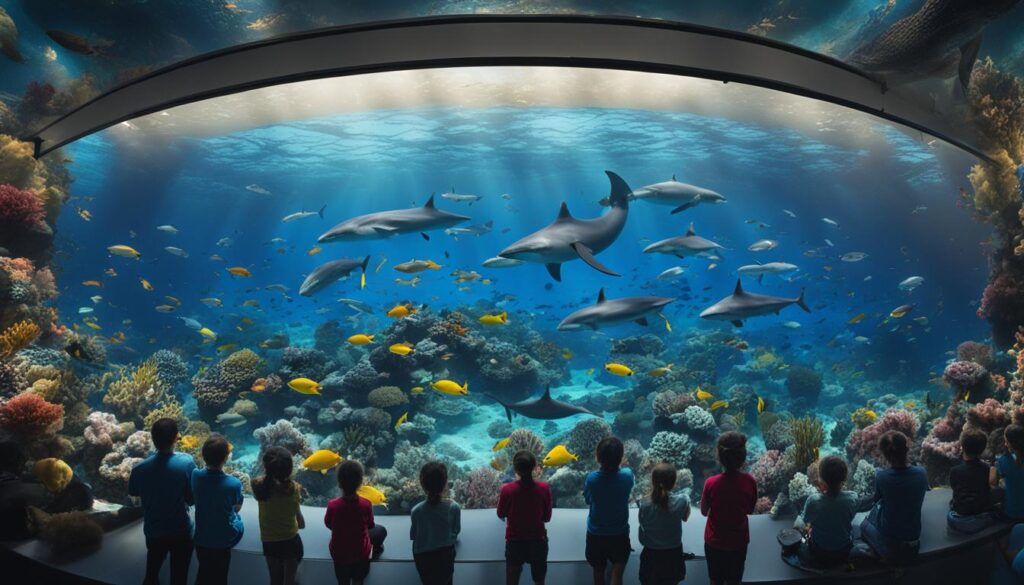
Marine Conservation Action Fund Grants and Fellowships
| Grant/Fellowship | Focus Area | Project Description |
|---|---|---|
| Microgrants | Conservation projects | Provides funding for small-scale conservation projects that address urgent marine conservation needs. |
| Fellowships | Capacity building | Supports emerging leaders in marine conservation by providing training, mentorship, and resources to develop their skills and drive change in their communities. |
| Rapid Response Grants | Emergency situations | Offers rapid funding for time-sensitive projects that arise from unforeseen circumstances such as natural disasters or emerging threats to marine ecosystems. |
By investing in marine conservation projects globally, the New England Aquarium, through the Marine Conservation Action Fund, aims to create a ripple effect of positive change that extends far beyond its local reach. Together with their partners, they are working towards a future where marine life and ecosystems are protected, and communities thrive in harmony with the ocean.
Supporting the New England Aquarium’s Work
By supporting the New England Aquarium, you can make a tangible impact on marine conservation efforts. Your donations and contributions play a vital role in funding their important projects and initiatives.
The New England Aquarium is committed to protecting marine life and conducting groundbreaking research. With your support, they can continue to develop innovative strategies for preserving our oceans and advocating for sustainable practices. Your contribution directly contributes to the well-being of marine animals and the preservation of their habitats.
“The New England Aquarium relies on the generosity of individuals like you to make a difference in ocean conservation. Your support enables us to carry out our vital work in protecting marine life and raising awareness about the importance of preserving our oceans for future generations. Together, we can make a lasting impact on the health and well-being of our blue planet.” – John Smith, CEO of the New England Aquarium
In addition to supporting research and conservation efforts, your contribution also helps create educational experiences that inspire visitors to take action. Through interactive exhibits and programs, the aquarium fosters a love and respect for the ocean, empowering individuals to become advocates for marine conservation.
Ways to Support
There are several ways you can support the New England Aquarium’s work:
- Make a donation: Your financial contribution helps fund crucial research, conservation projects, and educational programs.
- Become a member: Join the aquarium as a member and enjoy exclusive benefits while supporting their mission.
- Volunteer your time: Get involved by volunteering at the aquarium and assisting with various activities and events.
- Spread the word: Help raise awareness by sharing information about the New England Aquarium and their conservation efforts with your friends and family.
Every contribution, big or small, makes a difference in the New England Aquarium’s mission to protect marine life and preserve our oceans. Your support is invaluable in ensuring a sustainable future for our blue planet.
| Donation Level | Benefits |
|---|---|
| Basic | Personalized thank you letter |
| Supporter | Recognition on the website |
| Premium | Invitations to exclusive events |
| Patron | Private behind-the-scenes tour |
Join us in supporting the New England Aquarium’s work and become part of the movement to protect and conserve our precious marine ecosystems. Together, we can make a positive impact on the future of our oceans.
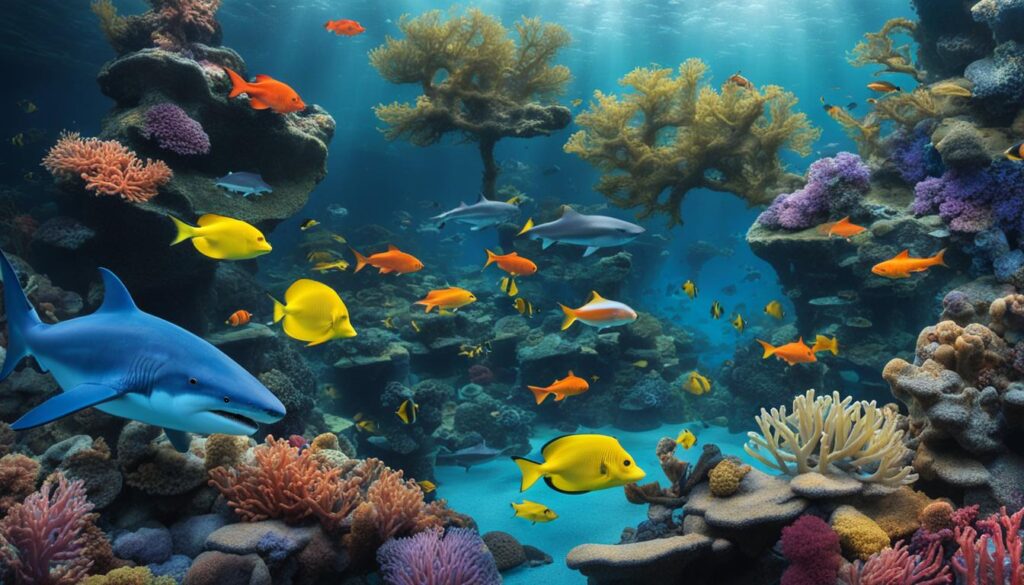
Conclusion
In conclusion, aquarium marine conservation tanks serve as invaluable platforms for raising awareness about the importance of protecting our oceans. Organizations like the New England Aquarium and the Anderson Cabot Center for Ocean Life play a significant role in safeguarding marine life, conducting research, and inspiring individuals to take action for marine conservation.
Through their conservation-focused tanks, these aquariums provide a safe haven for endangered and threatened species, highlighting the need for conservation efforts and the preservation of their habitats. By learning about eco-marine habitats and conservation tactics, visitors can gain a deeper understanding of their critical role in maintaining our oceans’ health.
The New England Aquarium also actively advocates for responsible fish trading practices in the tropical fish hobby. By promoting sustainable trading and discouraging harmful methods, such as poisoning reefs, they aim to protect natural habitats and reduce the mortality rate of tropical fish in the aquarium trade.
By supporting these organizations’ work through donations and contributions, individuals can actively contribute to preserving marine life. Their efforts in research, education, and partnerships have a global impact and are essential in ensuring our blue planet’s long-term health and sustainability.
FAQ
What can I expect to see in the aquarium’s marine conservation tanks?
The aquarium houses thousands of aquatic animals, including exotic species, in their conservation-focused tanks. These tanks provide a protected environment for endangered and threatened species, highlighting the importance of conservation and raising awareness about the need to protect these animals and their habitats.
What is the Anderson Cabot Center for Ocean Life?
The aquarium’s dedicated research arm is the Anderson Cabot Center for Ocean Life. They conduct studies and implement conservation tactics to preserve eco-marine habitats. They utilize innovative technologies and conservation tech tanks to gather data and develop strategies for marine preservation setups. By learning about these efforts, visitors can better understand the importance of protecting our oceans.
How does the aquarium promote responsible fish trading in the tropical fish hobby?
The aquarium encourages hobbyists to ensure sustainable fish trading practices, advocating for holding retailers accountable for responsible fish trading. They emphasize the need to avoid destructive methods such as poisoning reefs with toxic chemicals. By promoting responsible practices, the aquarium aims to protect natural reefs and reduce the mortality rate of tropical fish in the aquarium trade.
How does the Anderson Cabot Center for Ocean Life contribute to marine conservation?
The center conducts marine conservation research that informs policy decisions and improves industry practices. Their expertise and passion enable them to advocate for better animal well-being in both the Aquarium and the wild. Through their research and policy impact, they strive to protect the ocean and marine animals, locally and globally.
How does the aquarium inspire visitors to take action for marine conservation?
The aquarium inspires visitors to love, respect, and act for the ocean through its educational exhibits and experiences. From the Giant Ocean Tank featuring sea turtles to the Stellwagen Bank National Marine Sanctuary showcasing whales, the diversity of marine life comes alive, connecting people to the ocean and motivating them to take action in its protection.
What partnerships does the aquarium have for responsible ocean use?
The aquarium partners with industry, government, and corporations to advise and support science-based solutions for responsible ocean use. This includes supporting bluetech startups, counseling fisheries on resource management, and advising lawmakers on effective ocean policies. Their engagement aims to create engaged and resilient communities and promote global ocean conservation initiatives.
How does the Marine Conservation Action Fund make a global impact?
The Marine Conservation Action Fund is a micro granting and fellowship program that addresses critical needs in marine conservation globally. By providing rapid turnaround funding for time-sensitive projects and supporting entrepreneurial projects led by local conservation leaders in low- and middle-income countries, the fund makes a significant global impact in marine conservation efforts.
How can I support the New England Aquarium’s work?
Supporting the New England Aquarium enables the continuation of their vital ocean conservation and research projects. Donations and contributions help fund their efforts in protecting marine life, conducting research, and creating educational experiences for visitors. By supporting their work, individuals can actively contribute to preserving the marine environment.
What role do aquarium marine conservation tanks play in marine conservation?
Aquarium marine conservation tanks play a crucial role in raising awareness, protecting endangered species, and advocating for responsible practices in the aquarium and tropical fish hobby. Through research, education, and partnerships, organizations like the New England Aquarium and the Anderson Cabot Center for Ocean Life contribute to the preservation of our oceans and inspire individuals to take action for marine conservation. By exploring these aquariums and supporting their work, visitors can actively contribute to protecting our blue planet.



